Related Research Articles

Gun safety is the study and practice of managing risk when using, transporting, storing and disposing of firearms, airguns and ammunition in order to avoid injury, illness or death.
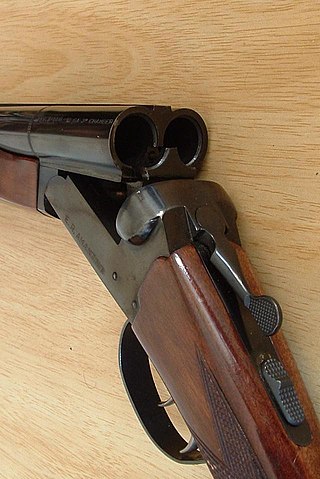
In firearms terminology, an action is the functional mechanism of a breechloading firearm that handles the ammunition cartridges, or the method by which that mechanism works. Actions are technically not present on muzzleloaders, as all those are single-shot firearms with a closed off breech with the powder and projectile manually loaded from the muzzle. Instead, the muzzleloader ignition mechanism is referred to as the lock.
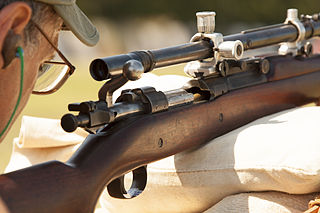
The chamber of a firearm is the cavity at the back end of a breechloading weapon's barrel or cylinder, where the ammunition is inserted before being fired. The rear opening of the chamber is the breech, and is sealed by the breechblock or the bolt.

A magazine, often simply called a mag, is an ammunition storage and feeding device for a repeating firearm, either integral within the gun or externally attached. The magazine functions by holding several cartridges within itself and sequentially pushing each one into a position where it may be readily loaded into the barrel chamber by the firearm's moving action. The detachable magazine is sometimes colloquially referred to as a "clip", although this is technically inaccurate since a clip is actually an accessory device used to help load ammunition into a magazine or cylinder.

A firearm is said to fire from an open bolt or open breech if, when ready to fire, the bolt and working parts are held to the rear of the receiver, with no round in the chamber. When the trigger is actuated, the bolt travels forward, feeds a cartridge from the magazine or belt into the chamber, and fires that cartridge in the same movement. Like any other self-loading design, the action is cycled by the energy released from the propellant, which sends the bolt back to the rear, compressing the mainspring in readiness for firing the next round. In an open-bolt gun firing semi-automatically, the bolt is caught and held at this point by the sear after each shot; and in automatic open-bolt fire, it's caught and held in this manner whenever the trigger is released. In contrast to this, in closed-bolt guns, the trigger and sear do not affect the movement of the bolt directly.
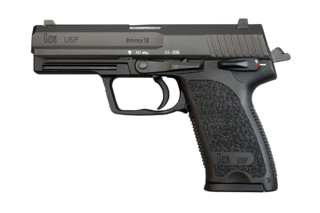
The USP is a semi-automatic pistol developed in Germany by Heckler & Koch GmbH (H&K) as a replacement for the P7 series of handguns.
A double tap is a shooting technique where two shots are fired in rapid succession at the same target with the same sight picture. Instruction and practice of the double-tap improves accuracy as shooters often do not have the gun fully extended on the first shot meaning the second shot of a double tap is usually more accurate. The term hammer is sometimes used to describe a double tap in which the firearm's sights are not reacquired by the shooter between shots.
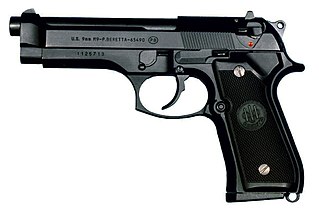
The Beretta M9, officially the Pistol, Semiautomatic, 9mm, M9, is the designation for the Beretta 92FS semi-automatic pistol used by the United States Armed Forces. The M9 was adopted by the United States military as their service pistol in 1985.
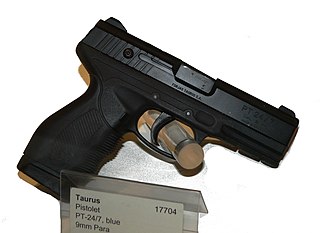
The Taurus PT 24/7 is a semi-automatic pistol using the short type of recoil operation, and available in various models with double-action-only (DAO) and double action/single-action-type trigger actions. Using a hammerless, striker-fired design, these pistols are manufactured by Forjas Taurus S/A in Porto Alegre Brazil and distributed in the United States by their subsidiary Taurus USA. The 24/7 product line was designed for the civilian concealed carry firearms market, and as backup weapons for law enforcement officers.

A trigger is a mechanism that actuates the function of a ranged weapon such as a firearm, airgun, crossbow, or speargun. The word may also be used to describe a switch that initiates the operation of other non-shooting devices such as a trap, a power tool, or a quick release. A small amount of energy applied to the trigger leads to the release of much more energy.

A snap cap is a firearm accessory device shaped like a standard cartridge/shotshell but contains no functional components, namely the primer, propellant (gunpowder) and projectile. It serves the same purpose as a dummy round, but different in that a dummy is usually modified from a real cartridge with its propellant and primer removed, while a snap cap has a monolithic outer shell and is specifically designed to be a fake cartridge from the very beginning.

Break action is a type of firearm action in which the barrel(s) are hinged much like a door and rotate perpendicularly to the bore axis to expose the breech and allow loading and unloading of cartridges. A separate operation may be required for the cocking of a hammer to fire the new round. There are many types of break-action firearms; break actions are universal in double-barreled shotguns, double-barreled rifles, combination guns, and are commonly found in single shot pistols, rifles, shotguns, including flare guns, grenade launchers, air guns, and some older revolver designs. They are also known as hinge-action, break-open, break-barrel, break-top, or, on old revolvers, top-break actions.

The cocking handle, also known as charging handle or bolt handle, is a device on a firearm which, when manipulated, results in the bolt being pulled to the rear, putting the hammer/striker into a spring-loaded ("cocked") "ready and set" position, allowing the operator to open the breech and eject any spent/unwanted cartridge/shell from the chamber, and then load a new round from the magazine or belt if required. By opening the breech, it also helps the operator to verify that the weapon's chamber is clear of any rounds or other obstructions; to clear a stoppage such as a jam, double-feed, stovepipe or misfire; to facilitate moving the bolt back into battery, acting as a forward assist ; and to release a bolt locked to the rear by a catching mechanism on a firearm equipped with a "last round bolt hold open" (LRBHO) feature.

Dry firing is the act of activating the firing mechanism a bow, crossbow, firearm or other projectile discharging weapon while unloaded or without live ammunition. The expression is also used to refer to practicing with an inert laser/infrared training platform and may also include the use of a target/feedback system.
Out-of-battery refers to the status of a firearm before the action has returned to the normal firing position.
The following are terms related to firearms and ammunition topics.
The Remington Model 887 Nitro Mag is a pump-action shotgun formerly manufactured by Remington Arms Company, Inc. It is noted for using a polymer finish called ArmorLokt, which is designed to survive any type of weather condition and leaves no exterior surfaces to rust. This gives the 887 a "space age" look which is one of the gun's more defining features.
A firearm malfunction is the failure of a firearm to operate as intended for causes other than user error. Malfunctions range from temporary and relatively safe situations, such as a casing that did not eject, to potentially dangerous occurrences that may permanently damage the gun and cause injury or death. Improper handling of certain types of malfunctions can be very dangerous. Following gun safety rules can prevent firearm malfunctions, and limit the damage inflicted by them if they do occur. Proper cleaning and maintenance of a firearm play a big role in preventing malfunctions.

Firearm maintenance is a series of routine preventive maintenance procedures aiming to ensure the proper function of a firearm, often with the use of a variety of specialized tools and chemical solutions. Typically such maintenance is performed by the firearm owner using either simple methods such as cleaning the firearm with oil or other cleaning solutions or more sophisticated practices such as lubricating moving parts with oil/grease and recoating exposed surfaces with protective finishes such as varnishing or bluing.

In firearms, a safety or safety catch is a mechanism used to help prevent the accidental discharge of a firearm, helping to ensure safer handling.
References
- ↑ Tong, David, "Trigger Options of the Semi-Automatic Service Pistol"
- 1 2 "When 'Tap, Rack, Bang' Doesn't Clear a Jam, Perform Remedial Action". Tactical-Life. June 14, 2019. Archived from the original on December 3, 2022. Retrieved August 30, 2020.
- ↑ Schley, Bill (2013-04-12). The UnStoppables: Tapping Your Entrepreneurial Power. John Wiley & Sons. ISBN 978-1-118-52621-7.
- ↑ Rementer, Stephen R.; Eimer, Bruce N. (2005). Essential Guide to Handguns: Firearm Instruction for Personal Defense and Protection. Looseleaf Law Publications. ISBN 978-1-889031-65-1.
- 1 2 "Perform Immediate Action to Get Your Jammed AR-15 Back in the Fight". Tactical Life. May 28, 2019. Archived from the original on October 1, 2022. Retrieved August 30, 2020.
- ↑ Immediate and Remedial Action - M9 Service Pistol, Marine Corp Development Command, p. 7, archived from the original on 2014-03-17, retrieved 2016-03-07
- ↑ "Firearms instructors offer advice on handling weapon malfunctions". ABC7: KLTV. February 28, 2013. Archived from the original on June 25, 2022. Retrieved 2020-08-30.